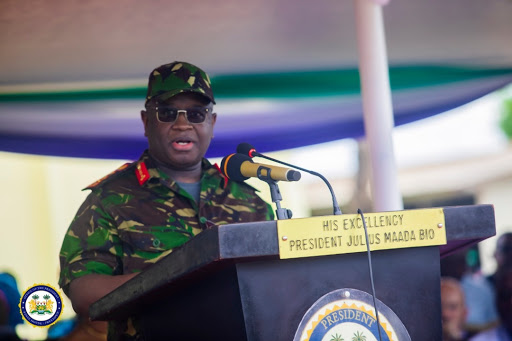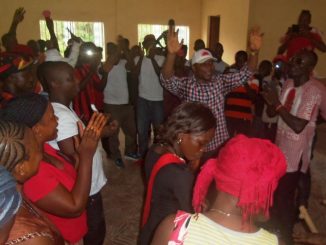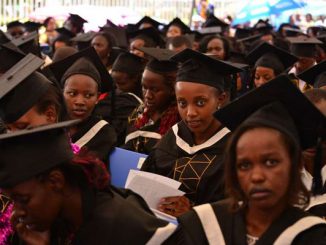
In the last four years alone in Sierra Leone, under the presidency of Rtd Brigadier Maada Bio, the police and presidential guards have killed more protesters than they did under the last two presidencies – of Kabba and Koroma, combined (a total of over twenty-one years). Some of the most heinous killings took place in Makeni, Lunsar, Tombo, and Freetown.
In 2020, prisoners at the Pademba Road Prison in Freetown were demonstrating in the prison yard to obtain protective wear against the spread of COVID-19 in the prison. They came under sustained machine gun attacks by presidential guards, who mounted their machine guns at the top of the hill above the prison and directed the barrels toward the prisoners. Scores were killed.
A government-censored report stated that ‘only’ thirty-one prisoners were killed. This is a huge underreporting of the actual number of prisoners who were killed. Pademba Road Prison is one of the most overcrowded prisons in Africa. Built in 1913 and opened in 1914, it was meant to hold 324 inmates. Today the prison has over 1,300 inmates.
The protest was related to COVID-19. One case had been found in prison, which led to restrictions on movement, but no basic protective wear, such as face masks, was provided for prisoners. In addition to the restrictions on movement, the chief justice suspended all court sittings and ordered the closure of a retail unit at the prison.
In Makeni, on 18th July 2020, six youths were gunned down by the police after staging a peaceful protest to prevent the removal of a stand-by electricity generator from the city by the government. In response, the government gave orders for the police to open fire on the protesters, killing six and wounding twelve.
In Tombo, the police were called to open fire on protesters, who had been stopped from taking their fishing boats to the water. This trivial disagreement, which could have been resolved by dialogue, was responded to by force. The result was the killing of two young men, who died of bullet wounds.
Last week’s widespread and bloody protests in Freetown and the provinces, which resulted in the killing of over twenty civilians and five police officers, have been brewing for the past few years as a result of corruption, bad governance, police brutality, entrenched unemployment and hardship felt by 68% of the country’s population.
Youth unemployment in Sierra Leone is about 70% across the country (an increase of 10.77% since 2019). These difficulties have been exacerbated by the arrival of COVID-19 and the manipulation of commodity prices by the government’s favoured traders. For example, Sierra Leone imports more than 60% of its rice, which is monopolised and controlled by a very tight and corrupt cartel of state-appointed traders, leaving local importers unable to trade in rice importation. Sierra Leone spends well over $240 million a year to import rice (these are underestimated government figures).
During the COVID-19 pandemic, the Sierra Leone government, like the government of The Gambia, received millions of dollars from the international community to provide emergency food support and COVID-19 protective wear to their populations. Whilst the government of The Gambia was very thorough in providing food and emergency support to every household in the country (for example, every household in The Gambia received a 50kg bag of rice along with cooking oil), the Sierra Leone government used the money to purchase thirty brand new Toyota Land Cruisers for its ministers and associated directors. The very small number of those who received some money from the state were all relatives of government ministers and directors. The result was a terrible degeneration into extreme hunger, poverty, and neglect for the most vulnerable families during prolonged lockdowns.
The current upheaval has been in the making for three years, capitalised on by social media influencers and opportunistic opposition politicians at home and abroad.
Young people who have managed to find work for themselves as Kehkeh drivers (like Tuk-Tuk – a three-wheel taxi) and motorcycle taxi riders are having a torrid time with the traffic police. Kehkeh drivers and motorcycle taxi riders are stopped at least five times a day by traffic police, who congregate at bottleneck junctions in cities to stop, harass and take money from them. Those who refuse to pay have their licences taken away from them or are sent to court for bogus offences such as speeding.
At one point at Up-Gun Roundabout in Eastern Freetown, we counted ten traffic police officers at a very narrow junction, all looking for riders to harass for money. With petrol costs increasing and the number of passengers decreasing, in addition to the high cost of living, riders are no longer willing to give money to traffic police officers. On two occasions in two weeks in July, riders staged a stay-at-home protest. A rider told me: ‘This is the worst government this country has ever seen. The president doesn’t talk to the country about what is happening; he is always out of the country.’
While extreme poverty has multiplied in the last four years in Sierra Leone, the number of high-value houses and four-wheel-drives has increased exponentially. Range Rovers are very common here, but Jeep Wranglers are now the new toys for ministers, directors and public sector managers – and for their girlfriends. At one point at a crossroads on Regent Road in Western Freetown, we counted six new Jeep Wranglers in five minutes. These top-of-the-range vehicles were decorated with various-coloured headlights shining in broad daylight that you would be forgiven for thinking that the factory was just down the road. Extreme corruption in Sierra Leone has become frighteningly blatant and barefaced.
In rural Sierra Leone, the situation is catastrophic – even in the government’s heartland of south-eastern Sierra Leone. In Bo city, magnificent new houses have started to spring up along the main highway going to Kenema, towards the stadium. They are like diamonds in elephant dung. These are the sorts of houses you would expect on the south coast of the USA. They are huge, bold, and unrepentant. A large proportion of key ministers and directors in this government come from this region, Southern Sierra Leone.
In Kenema, Eastern Sierra Leone, the poverty is dire. As we drove past, we saw a group of young girls and older women waiting to collect drinking water from a broken waste pipe that was laid between the main road and a truck repair garage in the middle of the city. I stopped my colleague and got out of the vehicle with my camera.
As I walked towards the women and girls collecting water, blaring music played at the opposite side of the road; a newly released political praise song by a southern regional artist:
Be ndei, be ndei mia! (Your brother is your brother!)
Ee nyamu beh ba gbua nge woma! (Even if he is bad, don’t leave him!)
Ee nya mu beh! (Even if he is bad!)
As I jumped back into the vehicle, my colleague laughed and told me the meaning of the song. My stomach churned; I wanted to vomit. ‘But this is a city with no decent hospital, no drinking water, no electricity, and it has the worst unemployment rate amongst young people, and they also have the worst maternal mortality rate in the country. Why?’ I asked my colleague. ‘Look, they are collecting drinking water from a broken sewer pipe that is contaminated with urine and faecal deposits from the homes of corrupt political officials!’
Maada came to public attention in Sierra Leone when he participated in a military coup in 1991. He had been part of a small group of young soldiers during the civil war who planned a military coup to oust the then government of Joseph Saidu Momoh. But on the night when they were supposed to travel to Freetown to carry out the attack, he reneged and stayed behind in the eastern city of Kenema whilst his colleagues left for Freetown, for fear that he would be killed if the plot failed.
Upon his colleagues’ success the next morning, Maada rushed to Freetown to join them. He was eventually given a ministerial responsibility that was lower than had been planned at the initial stage. Another young military officer, SAJ Musa, took Maada’s place as the vice president. SAJ Musa, however, was a hothead who had a terrible human rights record as vice president, carrying out summary killings and other gross human rights abuses and repressions.
Musa was eventually kicked out of the government by the NPRC – the military council that ruled the country. He was sent to England to study. Musa was then replaced by Maada, who finally assumed the position that had originally been earmarked for him during the coup’s planning stage. It wasn’t too long before Maada staged his own in-house coup and removed the man, Valentine Strasser, who had appointed him as vice president. Maada then sent Strasser into exile, having realised that the president was going to hand over the country to a democratically elected civilian government.
Maada, however, did not have the intellectual capability to present a credible counter-argument to the international community as to why the country should not return to a democratic civilian rule. He ruled for just over two months and was forced to hand over power to the elected government. Maada entered government as a second lieutenant but came out as a brigadier. His promotions were not earned in a battlefield but in the offices of State House, where he bestowed the title upon himself.
After leaving office, he went to the US to study for a master’s degree, and lived on the resources that he had taken from the state.
‘It is all in the name,’ someone told me. He is called Maada, which in Mende means ‘grandad’; a very powerful embodiment amongst the Mende people. It doesn’t matter whether the man is incompetent, corrupt, or bloodthirsty, his name is Maada, and that is what counts with the Mende people, which is why they tolerate living in extreme poverty. Their lands have been taken away from them and given to the Chinese, who carry out illegal timber logging and mining. Eastern Sierra Leone is now in the convulsions of environmental catastrophe caused by illegal mining and timber logging, and in addition has nearly 90% of its communities experiencing food insecurity, according to World Food Programme data.
To limit the possibility of being exposed as incompetent in his current administration, Maada got rid of his possible leadership challengers – such as Prof David Francis from Kenema and Dr Ali Kabba and Dr Jonathan Tengbeh from Kailahun. All of these men are from Eastern Sierra Leone. Instead, he concentrated key ministerial powers and directorships on those from Southern Sierra Leone, his home region.
Most of the people he has appointed as ministers and directors or heads of department, etc, have been exposed as having fake degrees. One of these people was the Inspector General of police, ‘Dr’ Sovula, who didn’t even have an undergraduate degree, let alone a master’s or a PhD. Someone told me that ‘Eastern Sierra Leoneans, who were the kingmakers in past elections, have been left high and dry, and they are not happy. There are no development projects here, no jobs, and no food. The coming elections will be very difficult for him in the east.’
Maada has become extremely paranoid – every legitimate criticism or protest is classed as an attempted coup. The Makeni incident was regarded as an attempted coup and the prison demonstration was considered a coup plot – hence the brutal response that resulted in the killing of scores of unarmed prisoners. Last week’s street protest was again regarded by the government as an insurrection. A security officer told me that amongst the president’s security details are foreign presidential guards from Burkina Faso, who are notoriously reckless with their guns. These are the guards who were sent to put down the prison protest and last week’s demonstrations. He doesn’t trust his own military to provide him with security. He took advantage of last week’s demonstrations and got rid of some senior military officers, most of them from the north, replacing them with people from mainly the southeast.
Instead of admitting failure, the government is blaming civilians and opposition politicians for plotting a coup. This line of defence is more appealing to Maada’s base, but it doesn’t fool the West. Some Westerners have even made a caricature of it. Take the prison incident, for example – the government called it a coup attempt, but an independent investigation later showed that the demonstration was entirely welfare-related.
In last week’s upheaval, there is video evidence of security forces firing live bullets into the crowd of demonstrators. Some of the women who went to protest on the streets were naked. In other areas, you can see schoolchildren holding placards, not guns. The attacks on the security forces only started when the police began firing tear gas and live bullets towards the youths – there is also video evidence of that.
The general Western consensus is that legitimate civilian grievances and concerns must be addressed legitimately, and the use of force and political oppression can only aggravate issues. But what Maada is doing is an attempt to restructure his position to hold on to power by using the coup plot lines to woo south-eastern voters.
You can also see that the electoral system is to be changed to one of proportional representation for the 2023 elections. Maada believes that his tribesmen can bail him out, which is why dissenting voices are now being hunted down and shot in cold blood. When I put these concerns to a senior security personnel sympathetic to the government, his language was expletive-laden against the West; he was ignoring the fact that even his uniform and salary is covered by Western money.
A few days ago, the Sierra Leone Police released a ‘Wanted’ list of protesters, which contained a photograph of a gun-toting youth amongst those they claimed were firing at police. He was the only one on the list with a gun – he turned out to be a Nigerian rapper called DaGrin who died twelve years ago in a car crash in Nigeria! The Sierra Leone government is using stock internet images to justify the killing of civilians and suppress freedom of speech.
I couldn’t help but reflect on the praise song as I walked through the rot of a nightmare government:
Be ndei, be ndei mia! (Your brother is your brother!)
Ee nyamu beh ba gbua nge woma! (Even if he is bad, don’t leave him!)
Ee nyamu beh! (Even if he is bad!)
It was like listening to a soundtrack of a horror movie.
About the author
Ruben Rubadoveski is a freelance journalist based in the USA.



